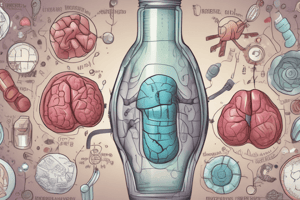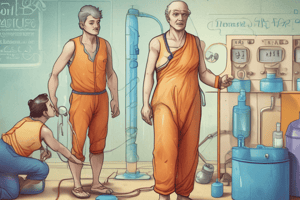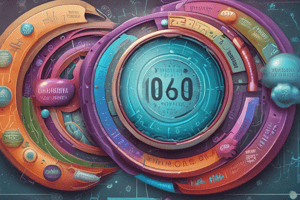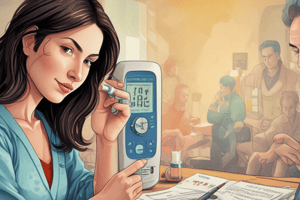Podcast
Questions and Answers
Which age group is most commonly affected by asthma?
Which age group is most commonly affected by asthma?
- Adults between 30-50
- Children under 5 (correct)
- Older adults over 65
- Teenagers between 13-18
What is the primary purpose of rescue inhalers in asthma management?
What is the primary purpose of rescue inhalers in asthma management?
- To provide quick relief during asthma attacks (correct)
- To prevent exercise-induced bronchoconstriction
- To control long-term symptoms
- To monitor lung function
What is the most common cause of myocardial infarction?
What is the most common cause of myocardial infarction?
- High blood pressure
- Genetic mutation
- Bacterial infection
- Atherosclerosis (narrowing of arteries) (correct)
What is often referred to as the 'classic' symptom of a heart attack?
What is often referred to as the 'classic' symptom of a heart attack?
What role do blood clots play in the development of myocardial infarction?
What role do blood clots play in the development of myocardial infarction?
Which enzyme is often measured in blood tests to diagnose myocardial infarction?
Which enzyme is often measured in blood tests to diagnose myocardial infarction?
What is the role of glucagon in diabetes management?
What is the role of glucagon in diabetes management?
What is a symptom of an asthma emergency that requires immediate medical attention?
What is a symptom of an asthma emergency that requires immediate medical attention?
What organs are affected by long-term complications of diabetes?
What organs are affected by long-term complications of diabetes?
What is the difference between allergic and non-allergic asthma?
What is the difference between allergic and non-allergic asthma?
What is true about gestational diabetes?
What is true about gestational diabetes?
What lifestyle factor is crucial for preventing or managing type 2 diabetes?
What lifestyle factor is crucial for preventing or managing type 2 diabetes?
What is the purpose of insulin therapy in diabetes management?
What is the purpose of insulin therapy in diabetes management?
What is a common complication of diabetes affecting the eyes?
What is a common complication of diabetes affecting the eyes?
What is the recommended strategy for treating hypoglycemia?
What is the recommended strategy for treating hypoglycemia?
What is a common symptom of hypoglycemia?
What is a common symptom of hypoglycemia?
What is the normal blood pressure reading?
What is the normal blood pressure reading?
What is hypertension often referred to as?
What is hypertension often referred to as?
Which lifestyle factor contributes to the development of hypertension?
Which lifestyle factor contributes to the development of hypertension?
Which organ is primarily affected by hypertension?
Which organ is primarily affected by hypertension?
Is hypertension a condition that only affects older adults?
Is hypertension a condition that only affects older adults?
Which blood pressure reading is considered hypertensive?
Which blood pressure reading is considered hypertensive?
What is the role of the renin-angiotensin-aldosterone system (RAAS) in hypertension?
What is the role of the renin-angiotensin-aldosterone system (RAAS) in hypertension?
What is the term for high blood pressure that is consistently elevated but not yet in the hypertensive range?
What is the term for high blood pressure that is consistently elevated but not yet in the hypertensive range?
What is the primary consequence of uncontrolled hypertension?
What is the primary consequence of uncontrolled hypertension?
What is the primary purpose of antihypertensive medications?
What is the primary purpose of antihypertensive medications?
Which condition is often associated with secondary hypertension?
Which condition is often associated with secondary hypertension?
How does stress contribute to hypertension?
How does stress contribute to hypertension?
What dietary component is often recommended to help lower blood pressure?
What dietary component is often recommended to help lower blood pressure?
What is the term for a hypertensive emergency that requires immediate medical attention?
What is the term for a hypertensive emergency that requires immediate medical attention?
Which of the following is a common symptom of hypertensive crisis?
Which of the following is a common symptom of hypertensive crisis?
How does potassium play a role in managing hypertension?
How does potassium play a role in managing hypertension?
Why is regular blood pressure monitoring important for individuals with hypertension?
Why is regular blood pressure monitoring important for individuals with hypertension?
What is the definition of hypotension?
What is the definition of hypotension?
What is the systolic blood pressure reading indicative of hypotension?
What is the systolic blood pressure reading indicative of hypotension?
Is hypotension always a cause for concern?
Is hypotension always a cause for concern?
What is a common symptom of hypotension?
What is a common symptom of hypotension?
What is a common cause of hypotension?
What is a common cause of hypotension?
What is orthostatic hypotension?
What is orthostatic hypotension?
What is the purpose of blood pressure regulation mechanisms in the body?
What is the purpose of blood pressure regulation mechanisms in the body?
Flashcards are hidden until you start studying
Study Notes
Diabetes Management
- Glucagon increases blood sugar levels.
- Long-term complications of diabetes can affect the heart and kidneys.
- Gestational diabetes occurs only during pregnancy.
- Regular physical activity is crucial for preventing or managing type 2 diabetes.
- Insulin therapy in diabetes management aims to lower blood sugar levels.
- Retinopathy is a common complication of diabetes affecting the eyes.
Asthma
- (Note: Questions 17-41 are not provided, so no notes can be generated for asthma)
Heart Health
- A myocardial infarction is a death of heart tissue due to a lack of blood supply.
- Atherosclerosis (narrowing of arteries) is the most common cause of myocardial infarction.
- Chest pain or discomfort is often referred to as the "classic" symptom of a heart attack.
- Blood clots block blood flow to the heart muscle, which can lead to myocardial infarction.
- Creatine kinase (CK) is an enzyme often measured in blood tests to diagnose myocardial infarction.
Hypertension
- Hypertension is often referred to as the "silent killer".
- Smoking is a significant contributor to the development of hypertension.
- The kidneys are primarily affected by hypertension.
- A blood pressure reading of 140/90 mmHg falls within the hypertensive range.
- The renin-angiotensin-aldosterone system (RAAS) helps maintain salt and water balance in the body.
- Prehypertension is a term for high blood pressure that is consistently elevated but not yet in the hypertensive range.
- Hypertension damages blood vessels and increases the risk of heart disease.
- Antihypertensive medications aim to lower blood pressure.
- Kidney disease is often associated with secondary hypertension.
- Stress triggers the release of stress hormones, raising blood pressure.
- Omega-3 fatty acids are recommended to help lower blood pressure.
Hypertensive Crisis and Hypotension
- Hypertensive crisis is a term for a hypertensive emergency that requires immediate medical attention due to severe symptoms and potential organ damage.
- A headache is a common symptom of hypertensive crisis.
- Potassium helps lower blood pressure.
- Excess alcohol consumption increases blood pressure.
- Regular blood pressure monitoring is essential for individuals with hypertension to allow for early detection of changes and adjustment of treatment.
- Hypotension is low blood pressure, with a systolic blood pressure reading below 90 mmHg.
- Dizziness or lightheadedness is a common symptom of hypotension.
- Dehydration can cause hypotension.
- Orthostatic hypotension is a sudden drop in blood pressure upon standing up, and is more common in older adults.
- The purpose of blood pressure regulation mechanisms in the body is to maintain blood pressure within a normal range.
Studying That Suits You
Use AI to generate personalized quizzes and flashcards to suit your learning preferences.




